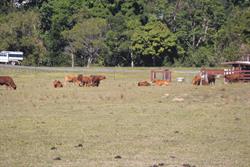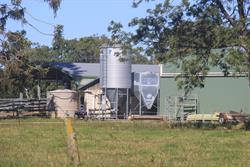 Farm Management knowledge is important for any farmer.
Farm Management knowledge is important for any farmer.
Develop heightened knowledge and skills in the management of farms as a step toward improved farm environmental sustainability, productivity and profitability in the 21st century.
Improve your capacity to more effectively manage a farm or agricultural enterprise which services farms. Farming is just as much about management as it is about animal or crop production. Unfortunately in today's world, the ability to produce a good animal or crop is no guarantee for success!
Through this course, learn to analyse, diagnose and make decisions related to the management of a farm business. The course relates to managing all resources, including; production, staff, physical resources, and natural resources. You learn strategic planning, whole farm planning, and how to prepare a business plan.
This course was developed by a team of experts from Australia and the UK, under the leadership of John Mason, author of three Farm Management books (published as imprints of Simon & Schuster and CSIRO).
Lesson Structure
There are 8 lessons in this course:
-
Strategic Farm Planning - planning procedures;the policy formulation approach, strategic management approach, initial strategy approach; Farm business structures; Management plans; Financial terminology and the money market; Finding finance; Rural finance sources; Financial terminology and record keeping; Contract law; Elements of a simple contract; Offers; Acceptance; Consideration; Strategic plans; Trusts
-
Farm Business Plans - Farm Planning; Quality management systems; Whole farm planning; Preparing a business plan; Integrated production plans
-
Farm Business Assessment - Business goals; factors involved in business assessment;Considering factors affecting your business; Drawing conclusions
-
Farm Viability Analysis - Assessing profit; Risk analysis and managing risk; Standards; Cost efficiency; Cost of production; Quality and quantity standards; Financial records; The bookkeeping process; End of period accounting; Cash flow; Example of budget; sensitivity analysis
-
Management Strategies for Farms - Organising the workplace; Scheduling; Production systems;system variables; Animal production systems; Lot feeding; Cropping systems; Polyculture; Office systems; Computers;Business diversification; Value adding
-
Managing Human Resources - Supervision; Oganisational structures; Leadership; Workplace changes; Interviewing, recruitment and staff induction; Giving instructions; Managing human resources; Work work scheduling; Occupational Health and safety; Duty of care; Protective equipment; Dealing with chemicals; Handling tools and equipment; Safety auditing
-
Managing the Physical Resources - Managing equipment, machinery and buildings; Managing physical resources;Engineering efficiency; Animal structures
-
Managing the Natural Resources - Regulations and legislation; Land Care programs; Rehabilitation; Trees; Erosion control; Soil degradation; Salinity; Soil acidification: Compaction; Chemical Residues; Water management; Water quality; Irrigation and watering systems
Aims
-
Develop strategic planning methods for an agricultural business.
-
Learn how to prepare a Farm Business Plan.
-
Develop methods for assessing the operations of a Farm Business.
-
Analyse the viability of different production enterprises:
-
assessing profits
-
risk analysis
-
cost efficiency
-
quality standards
-
financial records
-
Develop strategies for managing different farm production enterprises, covering workplace organisation and crop scheduling.
-
Plan the management of human resources in a farm business covering:
-
supervision
-
types of leadership/managers
-
orders & instruction
-
motivating employees
-
recruitment
-
Develop methods for managing the physical resources of a farm business including managing equipment, machinery and buildings.
-
Develop methods for managing the natural resources of a farm business, covering topics:
-
regulations & legislation
-
landcare programs
-
erosion control
-
soil degradation
-
salinity
-
soil acidification
-
chemical residues
-
compaction
What You Will Do
-
To manage a farm well requires careful planning. In most instances, you should plan for years, if not decades in advance. You should plan both the physical development of the farm property, as well as the development of the farm business.
-
Some of the things which may need to be planned for include:
-
Upgrading facilities (e.g. Introducing new technology, new procedures, replacing or improving worn out or damaged facilities)
-
Expansion of operations
-
Changing direction (e.g. moving from one type of livestock to another, or diversification)
-
Major maintenance (of property, buildings or equipment)
-
Training staff
-
Holidays
-
Contingencies in case of anything going wrong (e.g. economic downturn, drought, illness).
-
Sometimes a farm is bought and developed as a short term prospect. A farmer may approach a property from an investment perspective; with a view to improving facilities and business prospects over a relatively short period (e.g. a couple of years), and then selling it for a profit. In such situations, it may only be necessary to develop short term plans. In most cases however, farmers live for decades (and perhaps generations), on the same property: and these cases warrant very long term plans.
Farm Planning is Critical for Success
Planning is the foundation for farm management. If you don't have some sort of plan; you don't really have anything to manage.
In today's world, farms need to plan well in advance, in order to produce marketable produce; ensure financial stability, and ensure environmental sustainability; among other things.
There are many different ways to develop plans.
Integrated Planning is One Approach
Integrated Farm Management is an approach that balances well being of all life with profitability. The farm is managed in a way that it creates and maintains a healthy environment (for people, livestock, pastures and/or crops), and at the same time maintains economic viability.
Productivity is a key element in any business enterprise, farming included. The key to productivity is utilisation of the resources at your disposal to maximum effect. This means planting a particular crop at a certain time of the year for the greatest yield. Now in many cases the only way to acquire such knowledge is through experience and in many cases it may take years of local knowledge to understand seasonal variance in an area.
An integrated production plan should be as flexible as possible. It should be structured with long term and short term considerations in mind. For example pasture improvement and erosion management may mean blocking access to an area which is then temporarily unproductive. But what are the long term gains? How will productivity be influenced in 3 - 5 years time?

An Integrated Farm Plan might incorporate any or all of the following:
- Soil Management (i.e. Drainage, fertility, level of use)
- Water Management (i.e. conservation, irrigation)
- Energy Management
- Livestock Management (i.e. Health, Welfare)
- Crop Management
- Waste Management
- Business Management (i.e. Financial, organizational, marketing)
- Landcare (i.e. Wildlife management, Controlling land degradation, land rehabilitation)
- Human Well-being (i.e. OHS requirements being met, emotional well being)
One way a farmer might establish such a plan, could involve the following five steps:
- Farmer prepares a production plan for growing a crop and indicates, among other things, the physical layout of a paddock, estimated yield, list of materials and equipment, and timetable of work tasks.
- Budget prepared for production plan.
- Data is entered into computer records
- Risk management Analysis conducted –consideration given to all elements (eg. Soil, water, energy, waste management, land care, profitability, business management, human well being, impacts on wildlife, etc)
- Adjust production plan to address concerns raised by risk analysis, as much as possible.
Why You Need this Course
Many people learn about farming through experience, while others do a course. It's very easy though to learn a lot about some aspects of farm management; but miss learning anything at all about one or two very important aspects of managing the farm.
To be successful in modern agriculture; you need to have a fundamental understanding of all aspects of managing the farm. When you are able to see the full picture, you are only then able to see what needs attention at any one point in time. Graduates from this course are set on a path to continue growing their capacity to manage the farm, wherever it is located, and whatever changes are encountered in the future. This course sets you on a path to a greater chance for success, greater profitability and greater sustainability.
